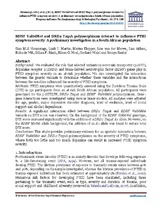BDNF Val66Met and DRD2 Taq1A polymorphisms interact to influence PTSD symptom severity: A preliminary investigation in a South African population
Date
2013Author
Hemmings, Sian M.J.
Martin, Lindi I.
Klopper, Marisa
van der Merwe, Lize
Aitken, Lisa
de Wit, Erika
Black, Gillian F.
Hoal, Eileen G.
Walzl, Gerhard
Seedat, Soraya
Metadata
Show full item recordAbstract
BACKGROUND: We evaluated the role that selected variants in serotonin transporter (5-HTT), dopamine receptor 2 (DRD2) and brain-derived neurotrophic factor (BDNF) genes play in PTSD symptom severity in an at-risk population. We also investigated the interaction between the genetic variants to determine whether these variables and the interactions between the variables influenced the severity of PTSD symptoms.
METHODS: PTSD symptoms were quantitatively assessed using the Davidson Trauma Scale (DTS) in 150 participants from an at-risk South African population. All participants were genotyped for the 5-HTTLPR, DRD2 Taq1A and BDNF Val66Met polymorphisms. Gene–gene interactions were investigated using various linear models. All analyses were adjusted for age, gender, major depressive disorder diagnosis, level of resilience, level of social support and alcohol dependence.
RESULTS: A significant interaction effect between DRD2 Taq1A and BDNF Val66Met variants on DTS score was observed. On the background of the BDNF Val66Val genotype, DTS score increased significantly with the addition of a DRD2 Taq1A A1 allele. However, on the BDNF Met66 allele background, the addition of an A1 allele was found to reduce total DTS score.
CONCLUSIONS: This study provides preliminary evidence for an epistatic interaction between BDNF Val66Met and DRD2 Taq1A polymorphisms on the severity of PTSD symptoms, where both too little and too much dopamine can result in increased PTSD symptom severity.

